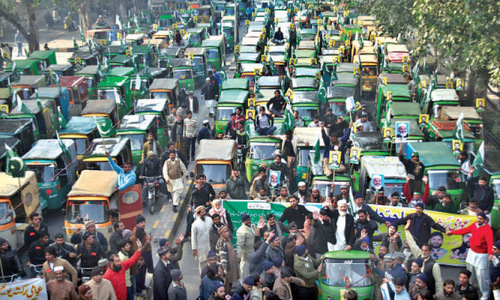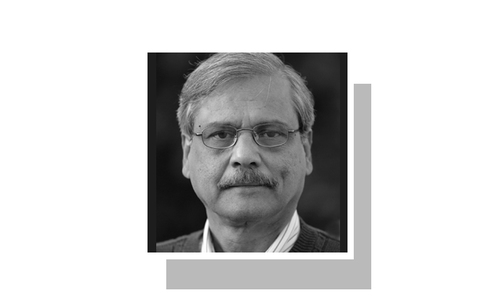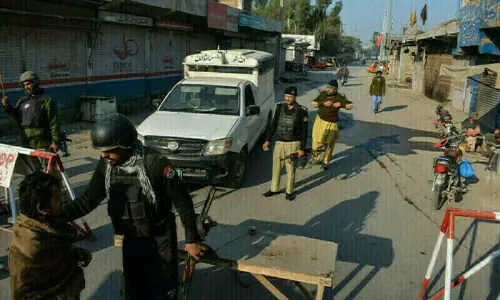I approached a beggar outside a shop. I gave him some money and then invited him to a cup of tea at a roadside place.
He seemed to be in his early 30s; his parents hailed from Swat in the Khyber Pakhtunkhwa province, but he was born and raised in Karachi. He agreed to have tea with me.
Just after I had ordered two cups of tea, he asked: 'Ab aap poochein gay mein bheek kyoon maang ta houn?’ (Now you will ask me why I beg). His Urdu was clear; crisp.
‘No,’ I replied.
‘Then, why the hospitality?’ he inquired, one of his hands trembling. He noticed me noticing the hand. ‘Mien heroinchee nahi houn …’ (I am not a heroin addict).
‘Ghareeb ho …’ (You are poor), I said.
He didn’t reply. Instead he slowly turned his head and began to look towards the man who was preparing tea for us.
‘I am a journalist,’ I told him.
He turned his face towards me again: ‘Aap meri kahani likhain gey?’ (Are you going to write my story?).
‘No,’ I replied. ‘But I will ask you a question. And I hope you will answer honestly.’
He stared at me: ‘I cannot afford a decent meal in a day, but I can afford to tell the truth.’ He was Pukhtun, but continued to amaze me with his Urdu.
Impressed by his reply, I continued: ‘When you were asking people for money, I heard you say that you have no home, no family, nothing …’
‘That is true,’ he said, now looking towards the tea man again.
‘What happened to your family?’ I asked.
‘Pata nahi,’ (Don’t know), he said, shrugging his shoulders. ‘They were extremely poor. So I ran away from home, which was a hut. I was very young. I grew up on the streets …’
I could not complete my next sentence because he interrupted me: '... lived on the streets like a dog (Kuttay kay mafiq).'
The tea arrived. I asked him whether he would like to have some cake or biscuits with his tea. ‘Aap khaien gey?’ (Are you going to have some?), he asked.
‘No, but I’ll order some for you.’ I ordered a piece of cake and some biscuits.
‘So can I ask my question now?’ I requested. He nodded, while sipping his tea.
‘Have you ever wanted to kill someone you thought is responsible for your poverty?’ I asked pointblank.
He kept sipping his tea, entirely unperturbed by my question. After about a 30-second gap, he replied: ‘Jee …’ (yes). Apnay aap ko’ (Myself).
‘Why? Because you are poor?’ I enquired.
‘No,’ he replied. ‘Because I beg.'
‘You have to beg because you are poor,’ I said.
‘Millions of people are poor,' he replied, almost immediately. 'Not all of them beg,’ he said, turning to face me again.
I nodded and stared back at him: ‘Many well-off people say that those who go around killing people as suicide bombers do so because they are poor, ignored and uncared for …’
He sank his mouth in his cup of tea again: ‘Unn mein Khuda ka khauf khatam hogaya hai …’ (They have lost the fear of God).
‘They believe they are doing it for God,’ I replied. ‘I beg in the name of God,’ he half-smiled. ‘Does that make begging right?’
I smiled back: ‘I personally have no problem with what you do. Illiteracy and poverty can lead a person to beg, especially when he is uncared for and ignored.’
‘Have you ever begged?’ He asked nonchalantly.
‘No,’ I replied. ‘But, of course, you knew that. I am not trying to make you feel better. I am not justifying begging.’
He picked up a piece of cake that had arrived on a small plate: ‘Why are you asking me this? I am just a beggar. A nobody. Do you think I am a terrorist?’
I laughed. He didn’t.
‘No,’ I said, not laughing anymore. ‘Did you ever know someone who was as poor as you are and was being driven to commit a crime out of desperation?’
He snickered: ‘Yes. They became thieves, but all of them are in jail now.'
‘So none of them wanted to take their revenge against the government and society for their condition by killing civilians, soldiers and cops …?’ I asked.
'Khuda ka khauf khatam hogaya hai ...'
‘Is this how you see those who kill because they believe the society and state has treated them badly? That they have lost their fear of God?’ I asked.
He shrugged his shoulders: 'If I can't justify my begging, how can they justify their killing?'
'But you can justify your begging,' I said.
'No, I can't' he replied.
I continued: ‘Some people think terrorism is because of poverty and injustice, even though, I don’t know if you know this, but a lot of terrorism these days is also being done by young well-to-do folks. Did you know that …?’
He shook his head and went back to sipping his tea: ‘Khuda ka khauf khatam hogaya hai.’
I noticed that the tea man had kept turning his head and looking at the beggar and hearing our conversation, but without any significant expression on his face.
I offered the beggar a cigarette. He took one. I lit it for him: ‘My name is Nadeem,’ I said. ‘What’s yours?’
‘You are a curious man,’ he smiled. ‘You didn’t ask me why I beg, why I don’t work, whether I have any drugs on me …’
‘Do you?’ I asked. ‘No,’ he said.
‘Good,’ I replied. ‘I do not like drugs. Sometimes I drink, but not very frequently.’
‘Desi ya faaran?’ (Local or foreign?), he asked.
‘Donu, par achi quality ki’ (Both, but of good quality), I smiled, now lighting myself a cigarette as well.
He put a hand in his front pocket, the hand that was still trembling. He took out the 100 Rupee note that I gave him: ‘You are a very decent man. I can’t take this from you. I will waste it on cigarettes and cheap liquor. But if you can, give me your pack of cigarettes.’
‘No, no’ I pushed his hand away. ‘Please keep the money. And you can also keep my pack of cigarettes.’
‘Shukriya. Khuda aap ko khush rakhay’ (Thank you. May God keep you happy), he said, and went back to smoking his cigarette.
Before I could I ask my next question, he asked me one instead: ‘So why are well-to-do people doing terrorism?’
‘I don’t know,’ I shrugged my shoulders. ‘Maybe they are confused, believing they are serving their faith this way.’
He shook his head slowly but dismissively: ‘Khuda ka khauf khatam hogaya hai. How can anyone serve his faith without first fearing God?’
‘Or without respecting the life of His creatures,’ I added.
He agreed: ‘Yes. People are always asking me, why I beg, why I don’t work. What can I say? I can’t give anything to them. I have nothing, just nothing.'
At this point, the tea man turned around and told him something in Pushto. He half smiled.
‘What did he say?’ I asked.
‘He says I have a lot to give'.
'Like what?' I asked.
'Merey pas khuda ka khauf hai …’, he smiled. Saying this he suddenly got up, shook my hand, thanked me for the pack of cigarettes and walked away.
I told the tea man that I liked what he had said to the beggar. The man just nodded and mumbled (in Pushto-accented Urdu): 'Acha baat toh woh kar raha tha …’ (He [the beggar] was the one doing the good talk).
‘Indeed,’ I replied. I paid off the tea man and returned to my car. A few yards away was the beggar, going about his business: begging.
He had nothing to give. And yet, I felt he had given me a lot. But, I'm still not sure what.






































